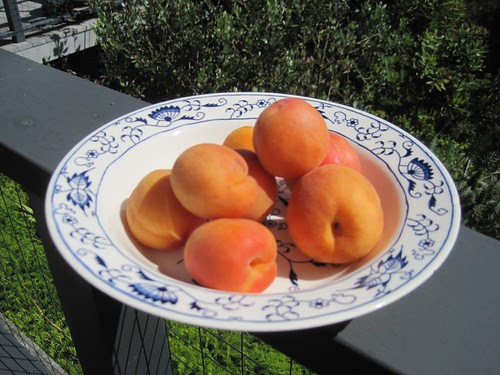 |
| The best ripe apricots in the world from the Santa Barbara Farmers' Market, 2012. How I wish it was always easy to get unprocessed food! |
“There is very clear observational data showing that people who have higher intakes of ultra-processed foods have higher levels of ill-health, whether it be cancer, cardiovascular disease, high blood pressure, obesity or type 2 diabetes.” (Statement from Dr Sarah Berry, a nutrition expert in the area of cardio-metabolic health at King's College in England.)
The Guardian today has an article titled "Fast food fever: how ultra-processed meals are unhealthier than you think." Understanding ultra processed food (UPF) and its consequences interests me quite a bit. This is a challenging subject: research on the effects of UPF has disclosed its association with obesity, cardiovascular disease, diabetes, dementia, and colon cancer. The article summarizes research on the role of inflammation in these and other health problems, and describes the mechanisms by which UPFs may trigger inflammation. It also discusses some political efforts in the UK to overcome some of the damage that they cause, including improving the foods and educating the consumers. This is a complex and active area of research, which I will not try to duplicate here -- you can read the article if you want details.
The ongoing research has created some understanding of a mechanism by which the food becomes such a risk to one's health. Obviously, humans since prehistoric times have been processing foods by chopping them up, cooking them, fermenting them, and other techniques, but UPF is something new. An expert epidemiologist quoted in the article summarizes:
“The ultra-processed nature of modern food generally means that the complex structure of the plant and animal cells is destroyed, turning it into a nutritionally empty mush that our body can process abnormally rapidly.”
Defining UPF is a scientific issue in itself. Four categories have been defined, but like all continuums, there are issues with classifying some foods. This doesn't mean it's not useful, just a challenge! There are various ways to classify and define processing; the article divides foods into the following groups:
- "unprocessed or minimally processed foods (fruit, vegetables, meat, eggs, milk)"
- "processed culinary ingredients such as sugars, oils and butter"
- "processed foods (canned vegetables and fish, bread, jam)"
- foods which "have undergone industrial interventions such as extrusion, moulding and milling" and which are "mostly low in protein and fibre, and high in salt, sugar and fat."
Do Calories Count?
"There are, for example, 678 calories in a Pret a Manger hummus salad, 684 in three Mars bars, and 708 in a portion of a Sainsbury’s fish and chips ready meal. These very similar numbers don’t tell us that the salad provides a third of our recommended daily fibre and half our daily fat; that the fish and chips contain almost half our daily salt but also half our daily protein; or that the chocolate bars would bust our sugar allowance. By only looking at calories – as on restaurant menus – we lose other, much more helpful information."
There's so much to learn and understand in the world of nutrition!

8 comments:
You’ve provided such an interesting and informative post Mae! I try to eat as many unprocessed foods as possible but there is so much information to learn. Thanks for sharing.
I'd never heard of the term "ultra-processed" before, but I understand it. We are a nation of lazy cookers. we don't want to deal with buying spices, herbs, etc, as well as following recipes that take longer than opening a can of premade food, or throwing a frozen meal in the microwave. I also am glad you shared the information on calories, because I have a friend who swears he lost over 100 lbs by allowing himself only 900 calories a day.
Hello,
The processed foods are terrible, I think they agitate my stomach.
I try to avoid buying the processed items. Take care, have a great day and happy new week!
I am quite sensitive to these nutritional issues, and more and more people in France are banning industrially processed foods. The English, who are already no gourmet chefs, and who for many years have adopted the products of the American food industry, are also very concerned. There is no particular danger in the case of products processed in an artisanal way. For bread, for example, old traditional flours with much less harmful gluten should be used. The question of yeast is also important (but this is a long chapter). A friend of mine has a very interesting site on this subject: https://www.le-mapp.com/. As far as wines are concerned, the main problem is sulphites, and more and more winegrowers are tending to reduce their content.
In France, we have a food classification with a nutriscore that evaluates the impact of fats and sugars. Despite the agri-food lobbies, they have been imposed by law, so that the big companies have gradually changed the composition of their prepared meals or industrial food. but there is still a lot to do. (kwarkito)
Interesting article, thank you for sharing!!
Another aspect is preservatives and the resulting shelf life of processed foods. I think fresh is best. But it's not always possible so then I look at what keeps it from spoiling.
OK -- I've never even heard of ULTRA processed! But yes, the real-deal is always better!
We were reading about processed foods last week and taking a tally of what we use. Not too much I am pleased to report!
Post a Comment